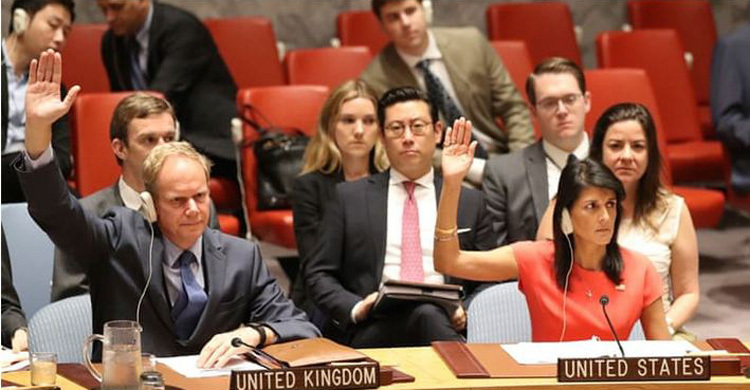UN Security Council adopts new N. Korea sanctions

The UN Security Council has approved a resolution toughening sanctions on North Korea over its nuclear and missile programme.
The Security Council unanimously adopted on Saturday the US-led resolution, which bans mineral and seafood exports worth more than $1bn.
The measures would be the seventh set of UN sanctions imposed on North Korea since it first carried out a nuclear test in 2006.
Saturday's move come after the North tested two intercontinental ballistic missile (ICBM) last month, prompting the US to lead a push at the UN for tougher sanctions.
The tests raised further alarm about North Korea leader Kim Jong-un's drive to develop a missile capable of hitting the US mainland.
Nikki Haley, the US ambassador to the UN, praised the new sanctions, telling council members after the vote that it is "the single largest economic package ever levelled against the North Korean regime."
But Al Jazeera's UN correspondent Rosiland Jordan said the US and China had significant differences when it comes to addressing North Korea's actions.
"The US has been stepping up its joint military exercises with South Korea and soon with Japan, really as a show of force against North Korea to try to make it reconsider its behaviour," Jordan said.
"The Chinese and the Russians don't like this show of military force by the United States. They say that this is a proactive action - almost as proactive as North Korea's actions to test intercontinental ballistic missiles and other ballistic missiles."
Liu Jieyi, China's ambassador to the UN, said the resolution "does not intend to cause a negative impact" to North Korea's people and stressed that it called for a return to talks on denuclearisation of the Korean Peninsula.
China also urged the US to halt the deployment of the THAAD anti-missile defence system in South Korea.
"The deployment of the THAAD system will not bring a solution to the issue of [North Korea's] nuclear testing and missile launches," the Chinese ambassador told the Security Council.
Russian ambassador Vasily Nebenzia stressed that sanctions "cannot be an end in themselves", but rather a "tool for engaging [North Korea] in constructive talks".

Export ban
The resolution bans North Korean exports of coal, iron, iron ore, lead, lead ore and seafood. This represented one third of its total exports last year, estimated at $3bn.
It also prohibits countries from increasing the current numbers of North Korean labourers working abroad, bans new joint ventures with North Korea and any new investment in current joint ventures.
The resolution adds nine individuals and four entities to the UN blacklist, including North Korea's primary foreign exchange bank, subjecting them to a global asset freeze and travel ban.
It also condemns North Korea's "massive diversion of its scarce resources" towards developing nuclear weapons, noting UN findings that well over half the population lack sufficient food and medical care.
The Security Council members also reiterated language in previous resolutions supporting a return to six-party talks with the goal of denuclearising the Korean Peninsula.
North Korea pulled out of the talks in 2009 in protest against international condemnation of a long-range rocket launch.
ASEAN appeal
Earlier on Saturday, Southeast Asia's top diplomats attending a regional security forum in Manila, in the Philippines, also criticised North Korea, saying its two ICBM tests last month threaten world stability.
"These developments seriously threaten peace, security and stability in the region and the world," the Association of Southeast Asian Nations (ASEAN) foreign ministers said in a statement on Saturday.
ASEAN Regional Forum is a 27-nation bloc that includes North Korea, South Korea, US and Japan.
Its position stopped short of a tougher line advocated by the US, which wanted the bloc to downgrade relations with North Korea.
Some Asian countries, including South Korea, are hoping to have bilateral talks with North Korea's foreign minister, Ri Yong Ho.
"If there is a chance, I would tell him that we must have dialogue and that the North must stop the continuous provocations," Kang Kyung Wha, South Korea's foreign minister, said.
North Korea's foreign ministry on Saturday said it had briefed diplomats of Indonesia, Laos, Vietnam and Cambodia in Pyongyang earlier in the week about the "resounding success" of its latest ICBM test.
Last week, North Korea's Kim said the the second ICBM missile test sent a "serious warning" to the US, which it also said has been "meaninglessly blowing its trumpet" with threats of war and stronger sanctions, according to the North's KCNA news agency.
Source: Aljazeera



